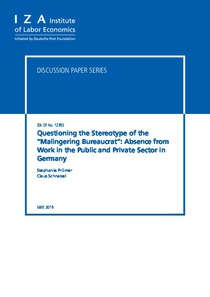Questioning the stereotype of the "malingering bureaucrat": absence from work in the public and private sector in Germany
"Public sector employees are often said to have excessive rates of absence from work. Using representative survey data for Germany, we indeed find absenteeism of employees to be higher in the public than the private sector. The differences in the incidence and days of absence showing up in desc...
| Main Authors: | , |
|---|---|
| Institution: | ETUI-European Trade Union Institute |
| Format: | TEXT |
| Language: | English |
| Published: |
Bonn
2019
IZA |
| Subjects: | |
| Online Access: | https://www.labourline.org/KENTIKA-19308478124911266509-Questioning-the-stereotype-of-.htm |
| Summary: | "Public sector employees are often said to have excessive rates of absence from work. Using representative survey data for Germany, we indeed find absenteeism of employees to be higher in the public than the private sector. The differences in the incidence and days of absence showing up in descriptive statistics are substantially reduced and partly disappear in our estimates of hurdle regression models controlling for individuals' socio-demographic characteristics, health status, professional activities, and for many workplace-related factors. Nevertheless, the probability of staying home sick at least once a year is still 5.6 percentage points higher in the public sector, ceteris paribus. This finding refutes popular assertions that differences in absence rates between the sectors are mainly due to structural factors like different compositions of the workforce. We show that the same observable factors play a role for absenteeism in the public and private sector, but we cannot rule out that shirking may play a more important role in the public sector. Nevertheless, we conclude that the stereotype of the "malingering bureaucrat" seems to be an exaggeration, at least for Germany." |
|---|---|
| Physical Description: | 46 p. Digital |

